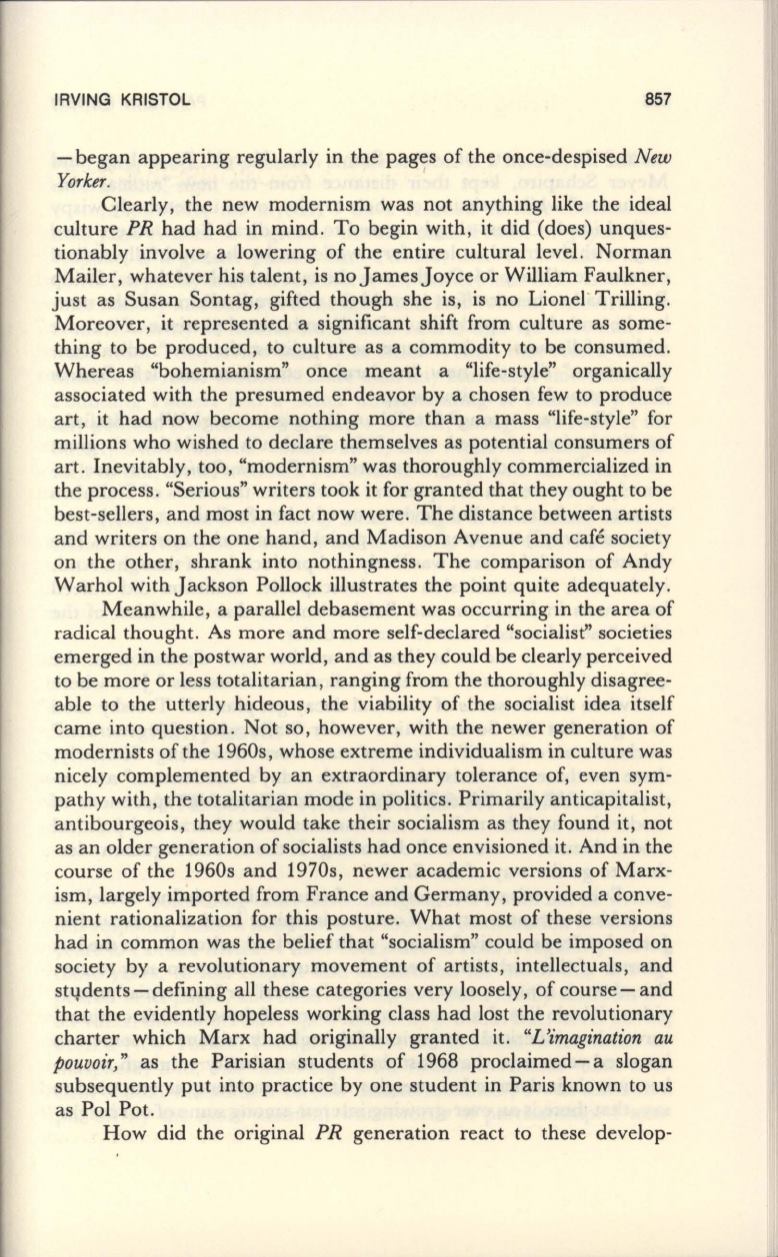
IRVING KRISTOL
857
-began appearing regularly in the pages of the once-despised
New
Yorker.
Clearly, the new modernism was not anything like the ideal
culture
PR
had had in mind . To begin with, it did (does) unques–
tionably involve a lowering of the entire cultural level. Norman
Mailer, whatever his talent, is no James Joyce or William Faulkner,
just as Susan Sontag, gifted though she is, is no Lionel-Trilling.
Moreover, it represented a significant shift from culture as some–
thing to be produced, to culture as a commodity to be consumed.
Whereas "bohemianism" once meant a "life-style" organically
associated with the presumed endeavor by a chosen few to produce
art, it had now become nothing more than a mass "life-style" for
millions who wished to declare themselves as potential consumers of
art. Inevitably, too, "modernism" was thoroughly commercialized in
the process. "Serious" writers took it for granted that they ought to be
best-sellers , and most in fact now were. The distance between artists
and writers on the one hand, and Madison Avenue and cafe society
on the other, shrank into nothingness. The comparison of Andy
Warhol with Jackson Pollock illustrates the point quite adequately.
Meanwhile, a parallel debasement was occurring in the area of
radical thought. As more and more self-declared "socialist" societies
emerged in the postwar world, and as they could be clearly perceived
to be more or less totalitarian, ranging from the thoroughly disagree–
able to the utterly hideous, the viability of the socialist idea itself
came into question. Not so , however, with the newer generation of
modernists of the 1960s, whose extreme individualism in culture was
nicely complemented by an extraordinary tolerance of, even sym–
pathy with, the totalitarian mode in politics . Primarily anticapitalist,
antibourgeois, they would take their socialism as they found it, not
as an older generation of socialists had once envisioned it. And in the
course of the 1960s and 1970s, newer academic versions of Marx–
ism, largely imported from France and Germany, provided a conve–
nient rationalization for this posture. What most of these versions
had in common was the belief that "socialism" could be imposed on
society by a revolutionary movement of artists, intellectuals, and
st4dents- defining all these categories very loosely, of course- and
that the evidently hopeless working class had lost the revolutionary
charter which Marx had originally granted it.
"L'imagination au
pouvoir,"
as the Parisian students of 1968 proclaimed- a slogan
subsequently put into practice by one student in Paris known to us
as Pol Pot.
How did the original
PR
generation react to these develop-


